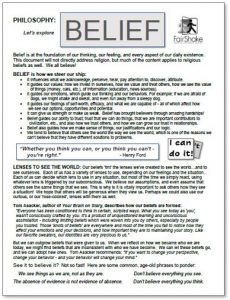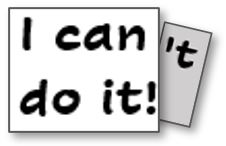And the trouble is, if you don't risk anything, you risk even more.
- Erica Jong |
Belief
Let’s Explore BELIEF
Belief is at the foundation of our thinking, our feeling, and every aspect of our daily existence. This document will not directly address religion, but much of the content applies to religious beliefs as well. We all believe!
“Whether you think you can, or your think you can’t – you’re right.” – Henry Ford
BELIEF is how we steer our ship:
+ It influences what we acknowledge, perceive, hear, pay attention to, discover, attribute.
+ It guides our values: how we invest in ourselves, how we value and treat others, how we see the value of things (money, cars, etc.), of information (education, news sources).
+ It guides our emotions, which guide our thinking and our behaviors. For example: if we are afraid of dogs, we might shake and sweat, and even run away from a sleepy dog.
+ It guides our feelings of self-worth, efficacy, and what we are capable of – all of which affect how we see our options, opportunities and potential.
+ It can give us strength or make us weak. Belief has brought believers through amazing hardships!
+ Belief guides our ability to trust; trust that we can do things, that we are important contributors to civilization, etc., and also how we trust others, and how we can grow our trust in relationships.
+ Belief also guides how we make sense of things; our justifications and our logic.
We tend to believe that others see the world the way we see the world, which is one of the reasons we find it hard to believe that they could have different solutions to problems!
LENSES TO SEE THE WORLD:
Our beliefs ‘tint’ the lenses we’ve created to see the world…and to see ourselves. Each of us has a variety of lenses to use, depending on our feelings and the situation. Each of us can decide which lens to use in any situation, but most of the time we simply react, using whatever lens is triggered by our subconscious. We believe our assumptions, and even assume that others see the same things that we see. This is why is it is vitally important to ask others how they see a situation! We hope that others will be generous when they view us. Perhaps we could also use our curious, or our ‘rose-colored’, lenses with them as well.
Tom Asacker, author of Your Brain on Story, describes how our beliefs are formed:
“Everyone has been conditioned to think in certain, scripted ways. What you see today as ‘you’, wasn’t consciously crafted by you. It’s a product of unquestioned learning and unconscious assimilation – including limiting beliefs which were woven into you by others, especially by people you trusted. Those ‘knots of beliefs’ are everywhere and most of the time you fail to notice how they affect your emotions and your decisions, and how important they are to maintaining your story. Like our favorite sweaters, our identities are very precious to us.”
But we can outgrow beliefs that were given to us. When we reflect on how we became who we are today, we might find beliefs that are inconsistent with who we have become. We can let these beliefs go, and we can adopt new ones.
“If you want to change your perspective, change your behavior – and your behavior will change your mind.” – Tom Asacker
See it to believe it? Not so fast! Here are some common, age-old phrases to ponder:
We see things as we are, not as they are. Don’t believe everything you see.
The absence of evidence is not evidence of absence. Don’t believe everything you think.
BELIEF IN YOURSELF: also known as Self-Efficacy Affirmation: “I can do this!”
Your “Agency” is your sense of power to determine – and to drive your life toward – your destiny.
“Our belief in our ability to succeed plays a role in how we think, how we act, and how we feel about our place in the world.” – Albert Bandura
Signs of Self-Determination, Self-Efficacy and Agency:
- You feel like you can handle problems if you are willing to work hard
- You feel confident that you can achieve your goals.
- You feel like you can manage unexpected events when they arise.
- You are able to bounce back fairly quickly after stressful events.
- You feel like you can come up with options when you are facing a problem.
- You keep trying even when things seem difficult.
- You stay calm even in the face of chaos.
- You perform well, even under pressure.
- You can focus on your progress, chipping away, rather than getting overwhelmed by all you still have to do.
Do you need to build your feelings of Self-Efficacy? Here are some things to try:
+ Celebrate your achievements! Reflect on the hurdles you surmounted and how much more you know.
+ Observe others. See how they progress and then see if you can do the same, or in your own style.
+ Have positive affirmations ready when you start something new. Develop a ‘positivity bias’.
+ Pay attention to your thoughts, your emotions, and your cues from your body.
Bridging Our Beliefs
Have you ever talked with someone who believes things that don’t make sense to you? Our mind creates stories to make sense of what we know when new information comes in. It also creates shortcuts to connect information, save energy and reduce confusion. The mind will create bridges between beliefs that might not clearly connect. Some of these bridges are helpful, some are not good for us or for others. Some of these bridges are called ‘magical thinking’. We make ‘sense’, or meaning, based on our beliefs and the way we connect them.
We also believe in others. We trust them to guide our sensemaking abilities. The level of trust we give them will contribute to the arch of assumptions that connects our beliefs. For instance, if we believe in one type of news source over another, the news source that we trust becomes part of the foundation of our assumptions; the things we believe to be true.
Questioning claims, statements, experts and evidence is not an attack. It is healthy.
Questions support critical thinking, wisdom, reflection, dialog and discovery toward the truth.
Obedience is not belief.
Skepticism: Curiosity or questioning of beliefs. It is very important for us to consider building a healthy level of skepticism since our information channels are being flooded with ‘fake’, and misleading information.
“We can’t solve problems by using the same kind of thinking we used when we created them.” – Albert Einstein
“The repetition of affirmations leads to belief. Once that belief becomes a deep conviction, things begin to happen.” – Muhammad Ali
“The difficulty lies not so much in developing new ideas as in escaping from old ones.” – John Maynard Keynes
“She believed in nothing. Only her skepticism kept her from being an atheist.” – Jean-Paul Sartre
POSSIBILITARIAN BELIEFS: important to build the future
Self-Determination + Self-Efficacy + Self-Reflection + Intention + Opportunity + Agency + Respect
Questions are crucial! Everyone is valuable and important! Yes, We Can! Where there’s a will, there’s a way.
No super-hero is coming to save us. Together, we can be the superhero we have been hoping for!




